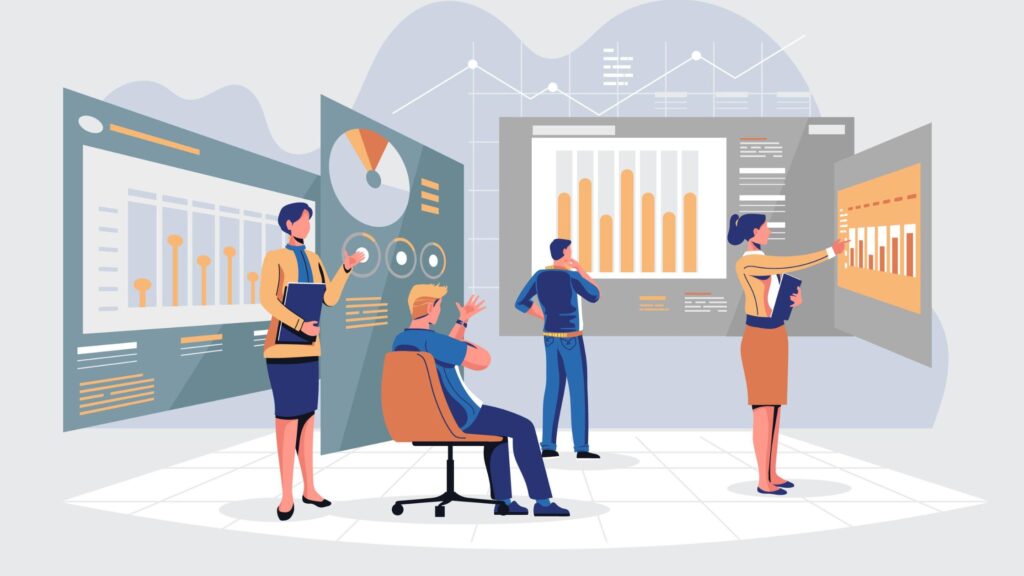What is Data Analytics? Definition, Applications, Everything You Need to Know
In today’s data-driven world, the term “data analytics” is a buzzword that has permeated almost every industry. From business and finance to healthcare and sports, data analytics plays a pivotal role in driving decision-making, uncovering insights, and optimizing processes. But what exactly is data analytics, and why is it so crucial? In this article, we will delve into the world of data analytics, breaking down its core concepts and exploring its profound impact on various sectors.
What is Data Analytics?
At its core, data analytics is the science of examining and interpreting data to extract meaningful insights and support informed decision-making. It involves the process of collecting, cleansing, transforming, and modeling data to uncover patterns, trends, and correlations. In a nutshell, data analytics helps organizations make sense of their data and use it to drive improvements, solve problems, and gain a competitive edge.
What are the 4 Types of Data Analytics?
Data analytics encompasses a wide range of techniques and methods, such as:

1. Descriptive Analytics
This involves summarizing historical data to provide an overview of what has happened, often in the form of reports and dashboards.
2. Diagnostic Analytics
Going a step beyond, diagnostic analytics aims to understand why certain events occurred by identifying causes and correlations within the data.
3. Predictive Analytics
Predictive analytics leverages historical data to make forecasts and predictions about future events, enabling organizations to anticipate trends and potential outcomes.
4. Prescriptive Analytics
This advanced stage of analytics not only predicts future scenarios but also suggests actions to optimize outcomes. It’s all about offering actionable insights and recommendations.
Data Analytics Applications: The Role of Data Analytics in Today’s World
Data analytics is more than just a tool for businesses. It’s a game-changer across various sectors:
1. Business and Marketing
In the corporate world, data analytics is the driving force behind strategies like customer segmentation, market analysis, and demand forecasting. By examining consumer behavior and market trends, businesses can make data-informed decisions to tailor their products and services, leading to higher profitability and customer satisfaction.
2. Healthcare
In the healthcare industry, data analytics aids in patient diagnosis, treatment optimization, and the identification of disease outbreaks. It also plays a critical role in improving the efficiency of healthcare operations, reducing costs, and enhancing patient outcomes.
3. Finance
Financial institutions rely on data analytics for fraud detection, risk assessment, and investment strategies. In the finance industry, it helps identify anomalies in transactions, detect potential security breaches, and ensure regulatory compliance.
4. Sports
Data analytics has revolutionized the world of sports. Coaches and analysts use player performance data to devise winning strategies, enhance player development, and maximize team efficiency. This has led to significant advancements in sports performance and strategy.
Data Analytics Tools

Data analytics tools are software solutions designed to assist individuals and organizations in analyzing data, deriving insights, and making data-driven decisions. These tools come in various shapes and sizes, each catering to different needs and skill levels. Here are some categories of data analytics tools:
1. Statistical Analysis Systems (SAS)
SAS tools are renowned for their versatility, making them a favorite among data scientists and statisticians. They are widely used for complex statistical analysis, data mining, and predictive modeling.
2. Business Intelligence (BI) Tools
BI tools like Tableau, Power BI, and QlikView are known for their user-friendly dashboards and interactive visualization capabilities. They make it easy for non-technical users to extract insights from data.
3. Open-Source Tools
Tools like R and Python are popular in the open-source community. They offer a wide array of libraries and packages for data analysis, making them flexible and cost-effective solutions for data enthusiasts.
4. Machine Learning Platforms
Machine learning tools like TensorFlow and scikit-learn are essential for organizations seeking predictive analytics and machine learning capabilities. They enable the development of sophisticated models for various applications.
5. Big Data Tools
With the advent of big data, tools like Hadoop and Spark have gained prominence. These tools are designed to handle and process massive datasets, providing scalable solutions for data analytics.
The Role of Data Analytics Tools
Data analytics tools play several pivotal roles in the decision-making process:
1. Data Exploration
Tools like Python’s pandas or R’s dplyr enable data analysts to explore datasets, uncovering patterns, trends, and outliers. They are the starting point for any data analysis project.
2. Data Visualization
Visualization tools like Tableau or Matplotlib help transform data into visually appealing charts and graphs. Visualization aids in understanding data quickly and communicating insights effectively.
3. Predictive Modeling
For forecasting and prediction, tools like scikit-learn and IBM Watson assist data scientists in building and testing machine learning models to make accurate predictions.
4. Real-Time Analytics
Tools like Apache Kafka and Apache Flink enable real-time data processing, allowing organizations to make decisions on the fly as data streams in.
5. Data Governance and Security
Tools like Informatica and Collibra help ensure data integrity, quality, and security, critical for regulatory compliance and protecting sensitive information.
Why is Data Analytics Important?
In today’s digital age, data is not merely a buzzword; it’s the lifeblood of businesses, organizations, and even individuals. The ability to collect, analyze, and derive insights from data has never been more critical. But why is data analytics important? In this article, we’ll unravel the profound significance of data analytics in our world.
1. Informed Decision-Making
At the heart of its importance lies the role of data analytics in enabling informed decision-making. It allows organizations to move away from gut instincts and base their choices on concrete evidence. Whether it’s a business strategy, product development, or resource allocation, data analytics provides the insights needed to make the right decisions, ultimately leading to better outcomes.
2. Identifying Trends and Patterns
Data analytics helps uncover hidden patterns and trends within large datasets. These patterns might be difficult to spot through traditional means, but with the aid of data analytics tools, they become evident. Recognizing trends allows organizations to adapt, seize opportunities, and mitigate risks effectively.
3. Improved Operational Efficiency
Data analytics streamlines processes, reduces inefficiencies, and enhances operational performance. By analyzing data on key performance indicators (KPIs), organizations can pinpoint areas in need of improvement, optimize resource allocation, and enhance overall efficiency. This, in turn, leads to cost savings and better resource management.
4. Enhanced Customer Experiences
Customer-centric businesses thrive on data analytics. By understanding customer behaviors and preferences, companies can tailor their products and services to meet specific needs. Personalization, recommendations, and targeted marketing all rely on data analytics to create a superior customer experience.
5. Fraud Detection and Security
Data analytics is invaluable in identifying fraudulent activities. In financial institutions and e-commerce, for instance, it helps flag suspicious transactions in real-time, preventing financial losses and safeguarding sensitive data.
6. Healthcare Advancements
In healthcare, data analytics plays a pivotal role in improving patient care. From predictive analytics that aids in early disease detection to treatment optimization and resource allocation, data analytics is saving lives and enhancing healthcare systems.
7. Scientific Research and Discoveries
In the realm of scientific research, data analytics accelerates discoveries by processing and interpreting vast amounts of data. Fields like genomics, astronomy, and climate science rely on data analytics to uncover insights that were previously unattainable.
8. Predictive Maintenance
Industries such as manufacturing and transportation benefit from predictive maintenance powered by data analytics. By analyzing data from machinery and equipment, organizations can predict when maintenance is required, reducing downtime and preventing costly breakdowns.
9. Financial Planning and Risk Management
Financial institutions rely heavily on data analytics for risk assessment and portfolio management. By analyzing market data, customer profiles, and economic indicators, they can make well-informed investment decisions and manage risks effectively.
10. Competitive Advantage
In a fiercely competitive business landscape, data analytics can be a game-changer. Companies that harness data analytics gain a competitive edge by responding quickly to market changes, staying ahead of trends, and continuously improving their operations.
The Big Data Revolution
The explosion of big data has transformed the landscape of data analytics. As data volumes continue to grow exponentially, traditional data analysis methods have given way to more sophisticated techniques, including machine learning and artificial intelligence. These technologies can process massive datasets, detect intricate patterns, and make real-time decisions, empowering organizations to gain insights that were previously unimaginable.
Data analytics is the art and science of making sense of data. It is a crucial driver of innovation, efficiency, and informed decision-making across a wide range of industries. From improving customer experiences to revolutionizing healthcare, data analytics is at the forefront of the digital age. So, the next time someone asks, “What is data analytics?” you’ll be well-equipped to explain its profound significance in today’s data-driven world.
Related Reading: Big Data in the Public Sector – Challenges and Importance
Related Reading: 8 Automations Every Business Should Implement to Increase Profitability











